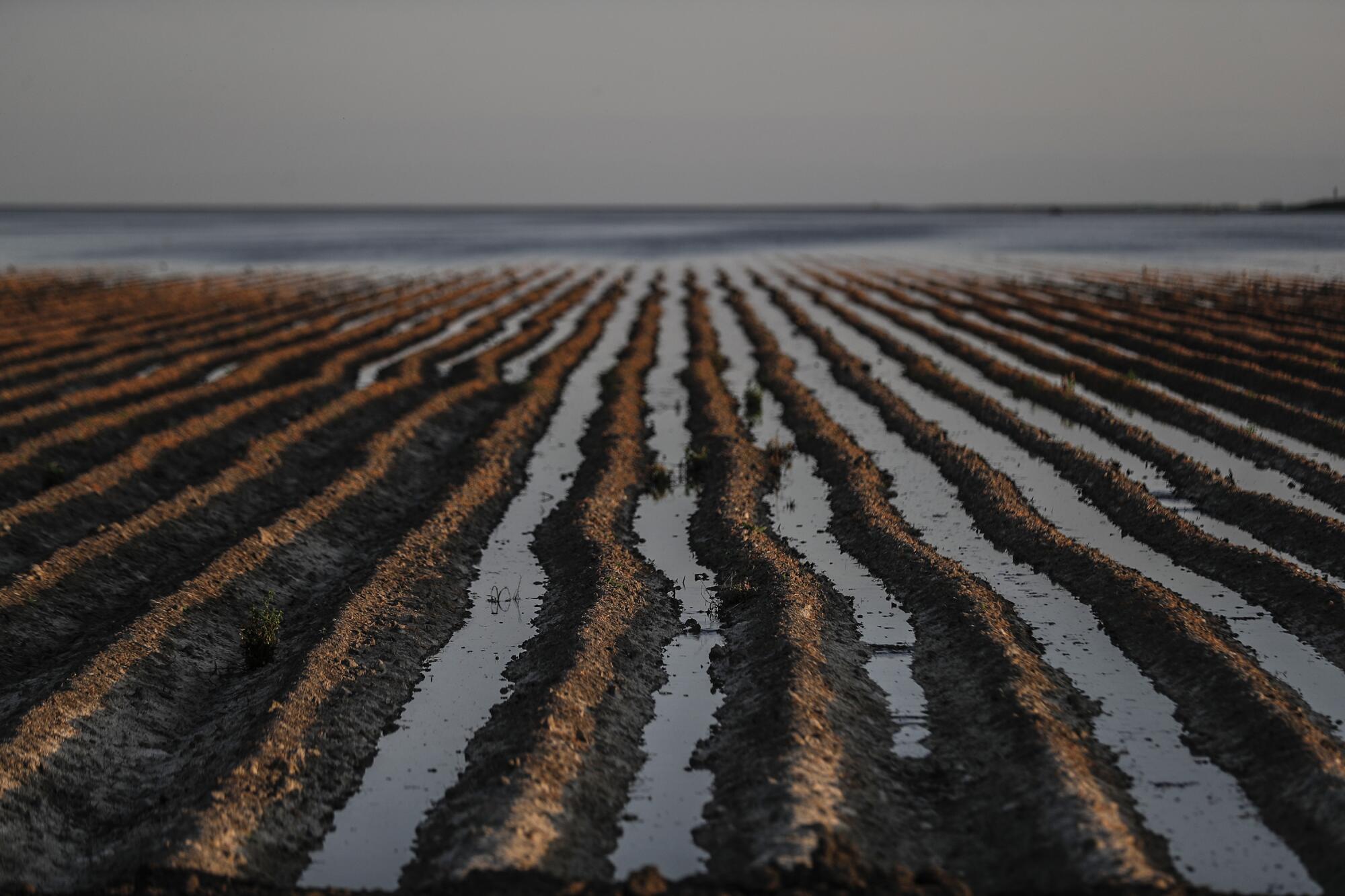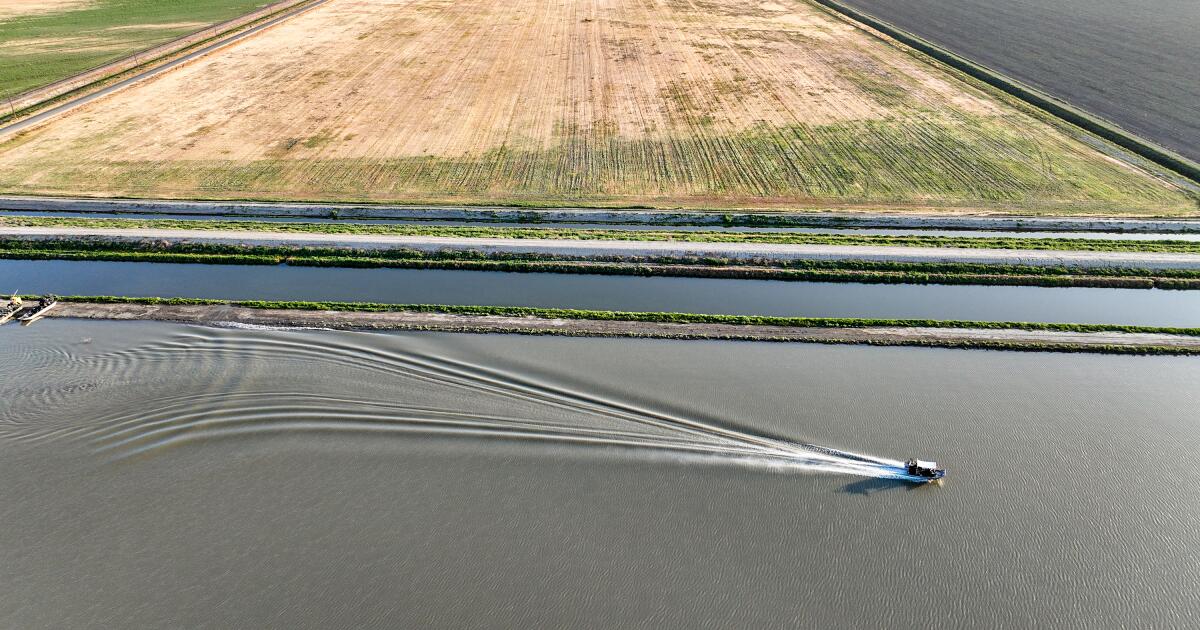California water regulators took the unprecedented step of cracking down on one of the state’s major farming regions for failing to take steps to curb growers’ excessive pumping of groundwater, which has sent water levels into rapid decline and is causing the land to sink.
The State Water Resources Control Board voted unanimously Tuesday to place the Tulare Lake basin on “probationary” status for failing to adopt sufficient measures to address chronic overpumping.
Falling groundwater levels have caused the ground to sink as much as 6 feet in parts of the area over the last decade, and state officials have determined that a local plan for managing groundwater would allow the free fall to continue. They say that without stronger measures, hundreds of household wells are at risk of running dry.
It’s the first time California officials have used their authority to intervene in a community to force stronger measures to rein in the depletion of groundwater, as required under the state’s decade-old Sustainable Groundwater Management Act (SGMA).
“The goal here is to set folks up for success locally. We recognize this is a really hard job,” board member Laurel Firestone said before the vote. “When these decisions are this big and this hard, sometimes it falls on the state to be the backstop, and that’s what I think we need to do.”
Now that the area in the southern San Joaquin Valley has been placed on probation, large agricultural landowners will be required to start reporting to the state how much water they pump from wells and paying fees based on how much they use.
The vote came at the end of a daylong meeting in Sacramento where farmers and representatives of local groundwater agencies urged the state water board to postpone the intervention and give them more time to improve their local plan for moving toward sustainable groundwater management.
Newsletter
Toward a more sustainable California
Get Boiling Point, our newsletter exploring climate change, energy and the environment, and become part of the conversation — and the solution.
You may occasionally receive promotional content from the Los Angeles Times.
Farmer Doug Freitas told the board that the “excessive costs” will severely harm the farming community.
“Don’t allow SGMA to kill, steal and destroy our lives,” Freitas said. “We the people of this great state of California would like to ask for additional time to solve these issues that need to be corrected.”
But board members said the state needs to step in.
“The goal here is to not be punitive in the least,” said Joaquin Esquivel, the board’s chair.
“The reality is that probation is a step,” Esquivel said. “It’s a process that ultimately is about local control.”

The State Water Resources Control Board’s action is the first of its kind to address overpumping of groundwater.
(Robert Gauthier / Los Angeles Times)
The Tulare Lake basin is one of six areas in the San Joaquin Valley where local groundwater plans have been deemed inadequate by the state.
Under the state’s 2014 groundwater law, the five local groundwater agencies in the basin are required to develop a plan for reducing pumping and curbing chronic declines in groundwater levels by 2040.
But the state water board’s staff last year recommended probationary status after finding the local plan didn’t include adequate measures to stop declines in water levels and the related problem of sinking ground, among other problems.
The land has been rapidly sinking in areas around the city of Corcoran. The levees that protect Corcoran from flooding have had to be raised twice in the last decade, including last year, when the long-dry Tulare Lake reappeared on thousands of acres of farmland.
“There have been and continue to be really severe impacts on people,” Firestone said. “Although changing and reducing pumping will have really severe impacts, doing nothing and continuing the status quo has already — and will continue to — have real impacts to communities, to the community infrastructure, to livelihoods. And so we’re doing this, I think, because we all recognize that we don’t have a choice.”
The decision represents the first phase of what could be a two-step process of state intervention. State officials say they will work with the five local groundwater sustainability agencies to collect data and develop a workable plan.
The area will be on probationary status for a year. Most well owners will be required to start reporting how much they use, while those pumping more than 500 acre-feet per year must install meters on their wells. Well owners also will be required to pay the state $300 per well plus a pumping fee of $20 per acre-foot, a measure intended to cover costs related to the state’s intervention.
“The first step we’re doing is getting information, getting a handle on what’s going on. That’s what probation means,” Firestone said. “We have to come to grips with where are the wells, how much is being pumped.”
The goal, state officials said, is to work with the local agencies to improve their plan so that state intervention is no longer needed.
But if the local agencies fail to address the deficiencies in their groundwater plan, the state water board would move into a second phase involving stronger intervention. State officials could then consider whether to impose pumping restrictions or issue fines when pumping exceeds limits.
State officials estimated that the local agencies’ plan would allow for continued declines in groundwater levels that would put about 700 domestic wells at risk of drying up.
“Groundwater supplies in the Tulare Lake basin are clearly at risk, and we are acting today to protect this resource because communities rely on it for basic needs, in particular drinking water,” Esquivel said. “Our goal remains that these basins be managed sustainably at the local level, and we are committed to helping groundwater agencies make that happen by providing data, guidance and support as they improve their plans.”

